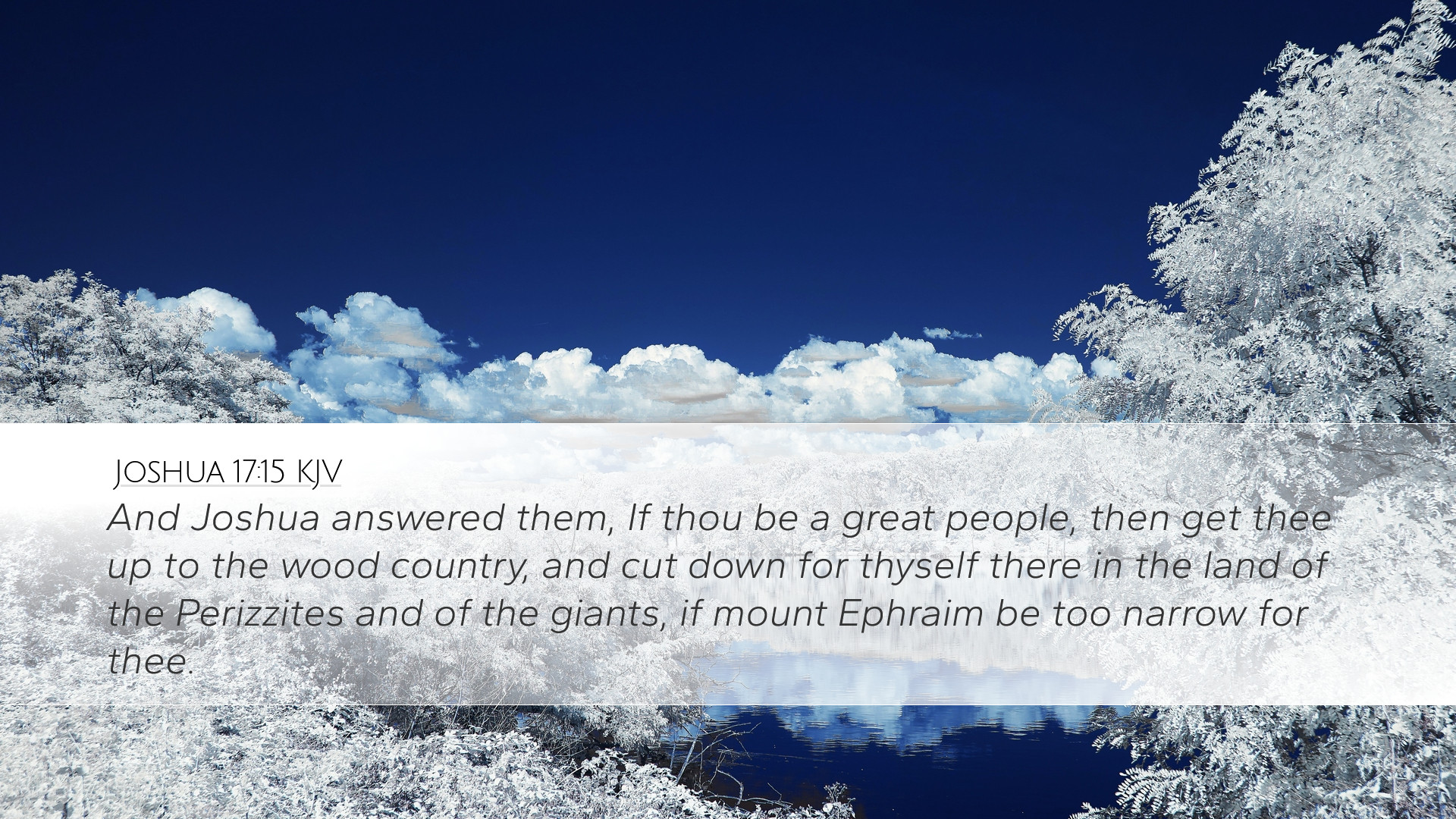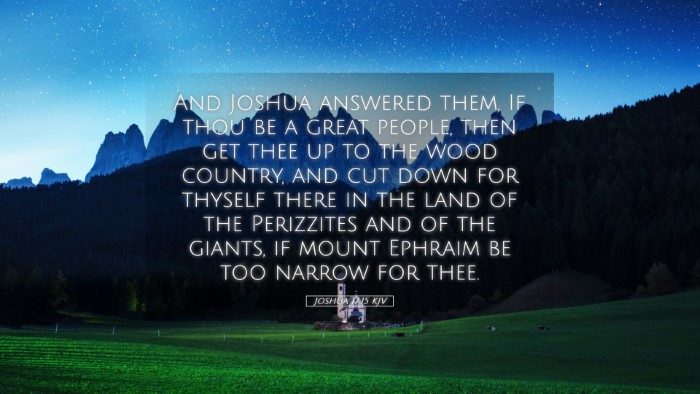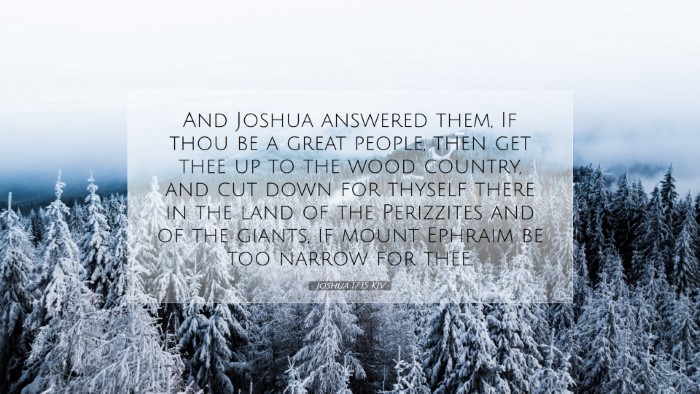Old Testament
Genesis Exodus Leviticus Numbers Deuteronomy Joshua Judges Ruth 1 Samuel 2 Samuel 1 Kings 2 Kings 1 Chronicles 2 Chronicles Ezra Nehemiah Esther Job Psalms Proverbs Ecclesiastes Song of Solomon Isaiah Jeremiah Lamentations Ezekiel Daniel Hosea Joel Amos Obadiah Jonah Micah Nahum Habakkuk Zephaniah Haggai Zechariah MalachiJoshua 17:15
Joshua 17:15 KJV
And Joshua answered them, If thou be a great people, then get thee up to the wood country, and cut down for thyself there in the land of the Perizzites and of the giants, if mount Ephraim be too narrow for thee.
Joshua 17:15 Bible Commentary
Commentary on Joshua 17:15
Joshua 17:15 reads, "And Joshua answered them, If thou be a great people, then get thee up to the wood country, and cut down for thyself there in the land of the Perizzites and of the giants, if Mount Ephraim be too narrow for thee."
This verse encapsulates a significant moment in the narrative of Israel's conquest and settlement in Canaan, revealing theological and practical implications that resonate through centuries for pastors, students, and scholars alike.
Contextual Background
The broader context of this chapter reveals the challenges faced by the tribes of Joseph—primarily Ephraim and Manasseh. These two tribes had received a substantial inheritance, yet the inhabitants of the land were formidable, and the mountains and hills posed challenges for expansion. The children of Joseph, particularly the descendants of Manasseh as described here, sought a resolution to their apparent lack of sufficient territory.
Isaiah Henry's Insights
According to Matthew Henry, the interaction between Joshua and the children of Joseph is significant. Henry notes that Joshua's response serves not only to address their complaint about limited land but also to challenge them to take initiative and trust in God's provision.
- The Challenge of Faith: Henry emphasizes that Joshua encouraged them to reflect on their own faith and resourcefulness. When they expressed dissatisfaction, Joshua pointed them to the wood country as a place with opportunity, thus reminding them of God's capacity to provide even in difficult situations.
- Division of Inheritance: The tension between contentment and ambition is a recurring theme in the biblical narrative. Henry suggests that the assertion of claiming one's inheritance is not merely physical but also a spiritual endeavor reflecting on God’s promises.
Albert Barnes Commentary
Albert Barnes adds depth by emphasizing the geographical implications of Joshua's directive. The 'wood country' refers to areas rich in natural resources yet underutilized by the tribes of Israel.
- Encouragement for Growth: Barnes highlights that Joshua’s counsel was aimed at encouraging growth and exertion. The children of Joseph were tasked with the physical labor of going into the woods, implying that their inheritance required effort and diligence.
- Spiritual Metaphor: He also draws a spiritual metaphor from this directive, illustrating that often, believers must venture into 'wooded' areas of their faith, areas that require growth and development, and venture out into challenges to realize the fullness of their inheritance in Christ.
Adam Clarke's Perspective
Adam Clarke provides an interpretive lens focusing on the practical aspect of land acquisition and the settlement process. Clarke interacts with the text by noting the cultural implications of the request for more land amidst the inhabitants' resistance.
- The Historical Context: Clarke explains that the Perizzites and giants represent significant adversaries. However, Joshua’s encouragement reflects a theme of confronting obstacles with faith, which is vital for understanding the narrative's application to believers today.
- Resource Utilization: Clarke further comments on how the direction to cut down trees underscores a call to utilize available resources. This idea is transformative for modern readers, as it calls believers to work diligently within the resources God provides.
Theological Implications
The theological underpinnings of Joshua 17:15 focus on several key areas.
- God's Promises and Human Responsibility: God’s promises are true, but there lies an inherent expectation for His people to act upon them in faith. The invitation to the wood country embodies an understanding of the relationship between divine sovereignty and human responsibility.
- Faith in Action: The exhortation to venture into the woods signifies the importance of faith being lived out through action. The children of Joseph were reminded that they were to take active steps to fulfill God’s promise.
- Inheritance Through Perseverance: This passage illustrates that inheritance in Christ comes through perseverance, suggesting that believers must engage with their challenges proactively rather than retreating out of fear or discomfort.
Application for Today's Believers
In light of this commentary, several practical applications can be drawn for contemporary believers.
- Courage to Step into Potential: Just as Joshua encouraged the children of Joseph to occupy new territories, modern believers are urged to step into their God-given potential, relying on His guidance and strength.
- Resourcefulness in Ministry: The call to cut down trees in the wood country can be seen as a directive for Christians to utilize their environment and resources effectively for ministry, recognizing that growth often requires hard work and initiative.
- Facing Challenges: The reminder that growth often occurs in the face of challenges is significant. Believers are encouraged to confront their 'giants' with faith, trusting in God to overcome obstacles.
Conclusion
Joshua 17:15 serves as a foundational verse that encompasses themes of faith, resourcefulness, and the challenges that accompany spiritual inheritance. Drawing from the rich insights of biblical scholars like Matthew Henry, Albert Barnes, and Adam Clarke, contemporary readers are reminded that the journey of faith requires proactive engagement, courageous heart, and uncompromising trust in God’s promises.


